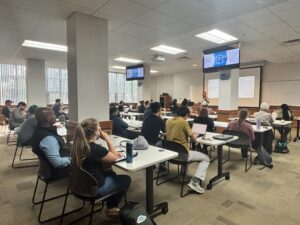In today’s rapidly changing world, it is crucial to a community’s prosperity to have a diverse industry base. As a result, some communities are reevaluating their traditional economic development models and shifting away from the industry that has defined them for decades in an effort to prepare for future economic downturns. Read on to discover how Dalton, Georgia, retooled their economic development offerings to attract new types of businesses to the Greater Chattanooga Region.
DALTON, GEORGIA: NO LONGER JUST THE “CARPET CAPITAL OF THE WORLD”
Dalton, Georgia is known colloquially as the “Carpet Capital of the World.” The nickname reflects the city’s historic prominence as a carpet manufacturing and production center. Early in the 20th century, entrepreneurs in Dalton began to explore more efficient methods of weaving and tufting carpets, and the city’s carpet industry began to flourish. By the 1950s, the city had become a hub for carpet production, with many companies operating factories in the area.
Today, Dalton remains a major center for the floor covering industry which employs tens of thousands in the region, with many of the world’s largest carpet manufacturers such as Shaw and Mohawk Industries maintaining a presence. Even though Dalton’s economy remains heavily reliant on the carpet industry, the city began efforts in the early 2000s to diversify its industrial base and attract new companies and industries to the area.
Carl Campbell, executive director of the Dalton-Whitfield Joint Development Authority says, “following a community economic development plan is vital but it isn’t always easy” when trying to make bold, transformational changes in a community that’s used to a specific type of industry.
Following the Great Recession, the greater Dalton community sought diverse industries to help it weather future downturns. As they began investing in a new, publicly owned industrial park, economic development leaders knew they could easily land carpet projects and claim success. Yet, in a bold move, leaders decided to reserve the park only for investments in industries other than floor coverings. As the nation began to recover from the recession and parcels in the industrial park sat empty, the economic development leadership had to defend its decision to focus on diverse industries — but they stood firm.
“In the early years of the new plan with a new business park, we found ourselves seeing lots of opportunities for expansions and new companies in the floor covering and even housing product industries, but not much else. Resistance to bringing those companies and investments to our community wasn’t popular, especially as time passed by, but our resolve eventually paid off,” Campbell says.
In 2019, Dalton/Whitfield County attracted Hanwha Q CELLS to the Carbondale Business Park, where the Korean-based company invested $150 million to build the largest solar manufacturing center in the Western Hemisphere. With a 300,000-square-foot facility and over 600 employees, this announcement was the first in a series of diverse industry wins for the community.
Other businesses followed and in 2020, German automotive parts manufacturer GEDIA selected the Carbondale Business Park to build a 180,000-square-foot facility, where the advanced manufacturer has already hired 100 workers and invested $85 million. GEDIA’s focus on the automotive industry, specifically electric vehicles, was another win for Dalton’s diversification efforts.
Recently, Dalton landed food manufacturer Essentia Proteins in the park, and Hanwha Q CELLS just announced a major expansion of their facility, bringing their total investment in Dalton to over $500 million and more than 1,500 jobs.
Campbell plans to continue to recruit a variety of industry types to the community. He says Dalton’s focus on new business sectors will help secure high-paying jobs for future generations and support a strong economy.
“We now have approximately 2,000 new diverse industry jobs that should add resilience for our citizens in the event of another housing downturn.”
Originally published through Livability, here. Find more insights at LivabilityMedia.com.











